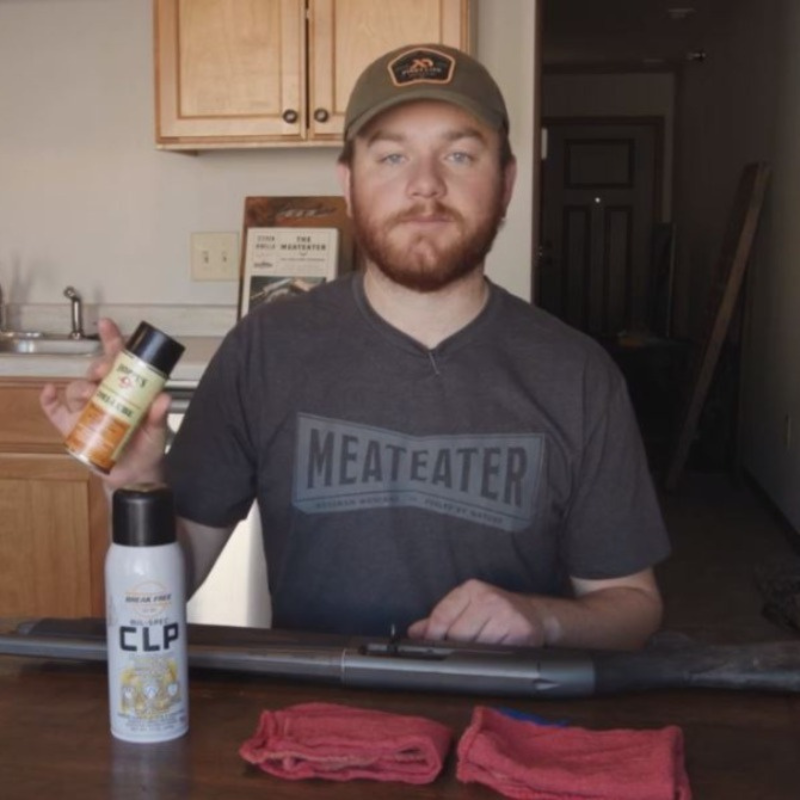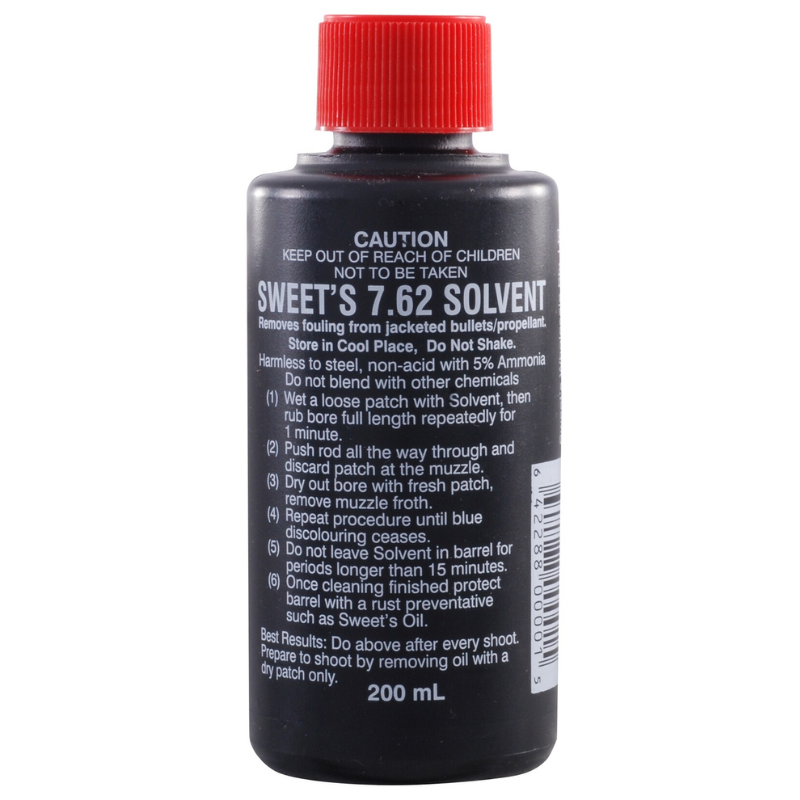There are many reasons the U.S. military’s M16 rifle earned a bad reputation in Vietnam. Chief among them? The failure of the Army to give its soldiers enough cleaning kits. Dirty rifles aren’t reliable, and the Army’s mistaken belief that the rifles were “self-cleaning” got some soldiers killed.
Don’t be like the U.S. Army. Get yourself some of these cleaning products and make sure your firearms are functioning smoothly. You probably won’t need it in the jungles of ‘Nam, but it’ll come in handy in the whitetail woods of Wisconsin, too.
Jump to: Cleaning Supplies We Use
Essential Gun Cleaning Supplies
A gun cleaning kit should have the supplies to perform two basic tasks: cleaning the crap and oiling the action. By “crap,” I mean everything that builds up in a gun’s bore and action as the result of powder burn: carbon, lead, and copper. Your kit should have the solvents to break down these materials and the brushes, patches, and picks to remove them. Then, you need to make sure the friction points are well-lubricated with an oil that will last until the next cleaning.
- Solvents
- Rods and Brushes
- Oil
- Cost
The Gun Cleaning Supplies We Use
To clean rifles and shotguns with any of these gun cleaning products, we recommend Tipton’s Ultra Gun Cleaning Kit. This packable kit comes with everything you need to clean long guns .22-caliber and larger. For pistols, check out Tipton’s Compact Pistol Cleaning Kit.
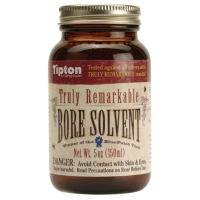 Tipton’s Truly Remarkable Bore Solvent
Janis’s Pick
|
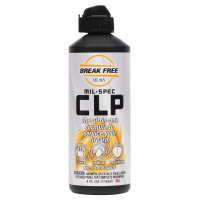 Break-Free CLP
Sean’s Pick
|
 J Dewey Cleaning Kits
Jason’s Pick
|
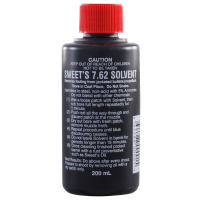 Sweet’s 7.62 Bore Cleaner
Kevin’s Pick
|
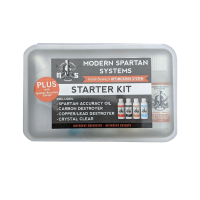 Modern Spartan Systems Starter Kit
Jordan's Pick
|
|
|---|---|---|---|---|---|
| Highlight | Best for Rifles | Best for Shotguns | Best All-Around Kit | Best Copper Solvent | Most Eco-Friendly |
| Product Type | Bore Cleaner | Cleaner + Lubricant | Full Kit | Copper Solvent | Full Kit |
| Materials Cleaned | Carbon, lead, copper | Carbon, lead | Carbon, lead, copper | Copper | Carbon, lead, copper |
| Delivery Method | Liquid | Aerosol | N/A | Liquid | Liquid |
| Amount | 5 oz/bottle | 4 oz/bottle | N/A | 6.8 oz/bottle | 2 oz/bottle |
| Price | $10* | $15* | $85* | $13* | $60* |
| Field Notes | Field Notes | Field Notes | Field Notes | Field Notes |
What Gun Cleaning Supplies do you Need?
1. Solvents
Gun cleaning solvents are designed to break down carbon, lead, and copper deposits left by powder and bullets/pellets exploding through the bore of a firearm. When you allow these powerful chemicals to soak into the bore and action, scrubbing out fouling with brushes and patches will be much easier. Some solvents are designed to attack carbon and lead while others are meant primarily for copper. You can also find do-it-all solvents for cleaning all three fouling materials. Refer to the instructions on the bottle for proper use, as different solvents are designed to soak for different lengths of time.
2. Rods and Brushes
To apply the solvent and remove the fouling, you’ll need some rods, brushes, patches, and jags. All four should match the caliber of firearm you’re using. Patches and rods will usually be marked with a caliber range (e.g., .22-.270 caliber), and brushes and jags are designed for only one specific caliber. If you’re cleaning a .308 Win., for example, you’ll purchase a jag and a brush for a .30-caliber firearm along with a rod and patches that can be used for the same.
Brushes come in nylon and brass varieties, and your solvent instructions should indicate which one to use. Rods are either single- or multi-piece. Multi-piece rods are nice because they break down and can fit in a bag, but some hunters prefer single-piece because they don’t bend as much. Either way, invest in a nice cleaning rod with ball bearings in the handle. It makes cleaning faster because it’s easier to work the bore brush and loosen up all the fouling.
3. Oil
Once the firearm is squeaky clean, it’s time to lubricate the moving parts. A bolt-action rifle only needs a little oil on the bolt, but a semi-auto firearm requires a greater degree of lubrication. Look for the friction points on the gun or read the owner’s manual for proper lubrication points. Remember, less is more! Oil attracts dirt, which can gum up an action faster than almost anything else. Apply the oil in small drops at the fiction points, test for functionality, and call it good.
4. Cost
Look for a cleaning kit that costs a little extra. This probably isn’t the advice you’re used to getting, but a high-quality gun cleaning kit is worth the investment. It will last for years, and the components will make cleaning faster and easier.
How Often Should I Clean My Guns?
This is the ultimate gun-cleaning question, and I’m sorry to say there isn’t a simple answer. Some folks won’t clean their guns until they start growing their own microbiome. Others clean their guns after every range session like some kind of religious fanatic. If you ask me, the best course of action is somewhere between those two extremes.
Not cleaning a gun for several hundred rounds might not permanently damage it (depending on the gun), but you’ll run into reliability issues and accuracy will suffer. Cleaning your gun after every trip to the range also has its disadvantages. First, you’ll run through solvents and oils much more quickly. You also run the risk of damaging your bore. Bore solvents and brushes are supposed to be safe on metal, but the harsh chemicals can wear down a barrel with constant use. This might not be a concern depending on how often you shoot, but cleaning after every range trip is just unnecessary. Few guns require it, so unless you shoot hundreds of rounds per trip, it's safe to put the gun back in the safe when you get home (after wiping it down with an oiled rag).
There are a few caveats to these generalizations. First, if you use corrosive ammunition, you should clean your gun after each use. Second, it’s a good idea to give your barrel a quick clean and wipe down the exterior surfaces with oil after every hunting trip even if you didn’t fire it. Moisture can be far more damaging than lead or carbon, so you want to make sure the barrel is clean and oiled after you’ve been in the field.
If you need a number, I like to give my guns a good cleaning after every 400 rounds or so. If you start to see accuracy or reliability issues prior to that, clean your gun earlier. If not, that’s a pretty good baseline.
Field notes from the MeatEater Crew
Janis’s Pick
Best for Rifles
Tipton’s Truly Remarkable Bore Solvent removes carbon, lead, and copper to cut down on cleaning time and keep your rifles accurate and reliable. MeatEater’s Janis Putelis recommends this solvent, and he used it in a recent video outlining his gun-cleaning routine.
"I like Tipton’s Truly Remarkable Bore Solvent because it’s an all-in-one bore cleaner that won’t break the bank," he said. "It clears out carbon, lead, and copper in a hurry, but I don’t have to worry that it will damage the barrel."
Paired with Tipton’s Ultra Gun Cleaning Kit and some Tipton CLP, you’ll be ready to clean virtually any caliber rifle and get it ready for your next hunt.
Specifications
- Product Type: Bore Cleaner
- Materials Cleaned: Carbon, lead, copper
- Delivery Method: Liquid
- Amount: 5 oz/bottle
- Estimated Price: $10
Sean’s Pick
Best for Shotguns
Your cleaning strategy should optimize your gun to your shooting conditions. For MeatEater’s Sean Weaver, that means getting his inertia shotguns totally clean and then avoiding standard gun oils.
"I like to run an inertia shotgun as dry as I can," he said. "If it's too wet and greased up, it'll gum up bad in the sub-freezing temps I regularly hunt. I use Break-Free CLP to get everything completely clean and void of grease, then just one quick shot of Hoppes Dri-Lube on the sliding part of the action."
Sean uses two rags to clean the action and receiver. One rag is his “wet rag,” which he uses to scrub the components with the CLP. He focuses especially on the bolt carrier rails and the corresponding grooves in the receiver. Then, he sprays those moving parts with the Dri-Lube, lets it dry, and wipes off the excess with the dry rag. To see him clean his shotgun, check out this video.
Specifications
- Product Type: Cleaner + Lubricant
- Materials Cleaned: Carbon, lead
- Delivery Method: Aerosol
- Amount: 4 oz/bottle
- Estimated Price: $15
Jason’s Pick
Best All-Around Kit
MeatEater’s Jason Phelps says he doesn’t start thinking about cleaning his guns unless they stop shooting well. That means that when it’s time to clean his firearms, he needs a kit that does it all.
"I’ve found J Dewey kits to be the best available," he said. The nylon-coated rods and bore guides make cleaning "quick and effortless," and Butch’s Bore Shine strips the barrel of carbon and copper without risking damage to the barrel. "For me, it’s the best option available for cleaning my guns," he said.
Each J Dewey kit comes tailor-made for a specific caliber, so you know all the jags and brushes will fit perfectly. They’re on the pricier side as far as gun cleaning products go, but they’ll likely last longer than you.
Specifications
- Product Type: Cleaning Kit
- Materials Cleaned: All
- Delivery Method: N/A
- Amount: N/A
- Estimated Price: $85
Kevin’s Pick
Best Copper Solvent
MeatEater’s Kevin Gillespie has lots of products in his gun cleaning kit, but he keeps coming back to Sweet’s 7.62 Solvent for heavy copper fouling.
"My dad and uncle got into a screaming match one night over what the best gun oil was. They never were able to agree on that, but they did both admit that the best copper solvent, especially for vintage military firearms, was Sweet’s," Gillespie recalled. "Yes, it’s smelly and full of ammonia, but it’s also the most effective remover of copper fouling I’ve ever seen."
As with many copper solvents, patches come out with a blue discoloration if copper has been removed. Once you stop seeing blue, you know your gun’s bore is clean.
Specifications
- Product Type: Cleaner
- Materials Cleaned: Copper
- Delivery Method: Liquid
- Amount: 6.8 oz/bottle
- Estimated Price: $13
Jordan's Pick
Most Eco-Friendly
Cleaning the junk that bullets and powder leave in your bore requires harsh chemicals. Those harsh chemicals aren’t great for your body or the environment, which is why I like the cleaning products from Modern Spartan Systems.
Their solvents and oils are made with nontoxic ingredients that don’t smell or as the company puts it, “etch metal or the inside of your brain.” I can use them in my shop or even in the house, and I don’t have to crack a window. Plus, they (somehow) do a great job cleaning my rifles, pistols, and shotguns. Patches come out just as dirty as with other products, and I haven’t noticed any performance reduction.
In fact, the company’s Accuracy Oil has improved shooting performance. While the results aren’t dramatic, I have noticed improved accuracy and increased velocity from barrels treated with Accuracy Oil. The product penetrates the metal to virtually eliminate friction, which means actions are smooth and barrel wear is kept to a minimum.
The cost per ounce is higher than other products, but for me, the extra change is worth it.
Specifications
- Product Type: Full Kit
- Materials Cleaned: Carbon, lead, copper
- Delivery Method: Liquid
- Amount: 2 oz/bottle
- Estimated Price: $60


